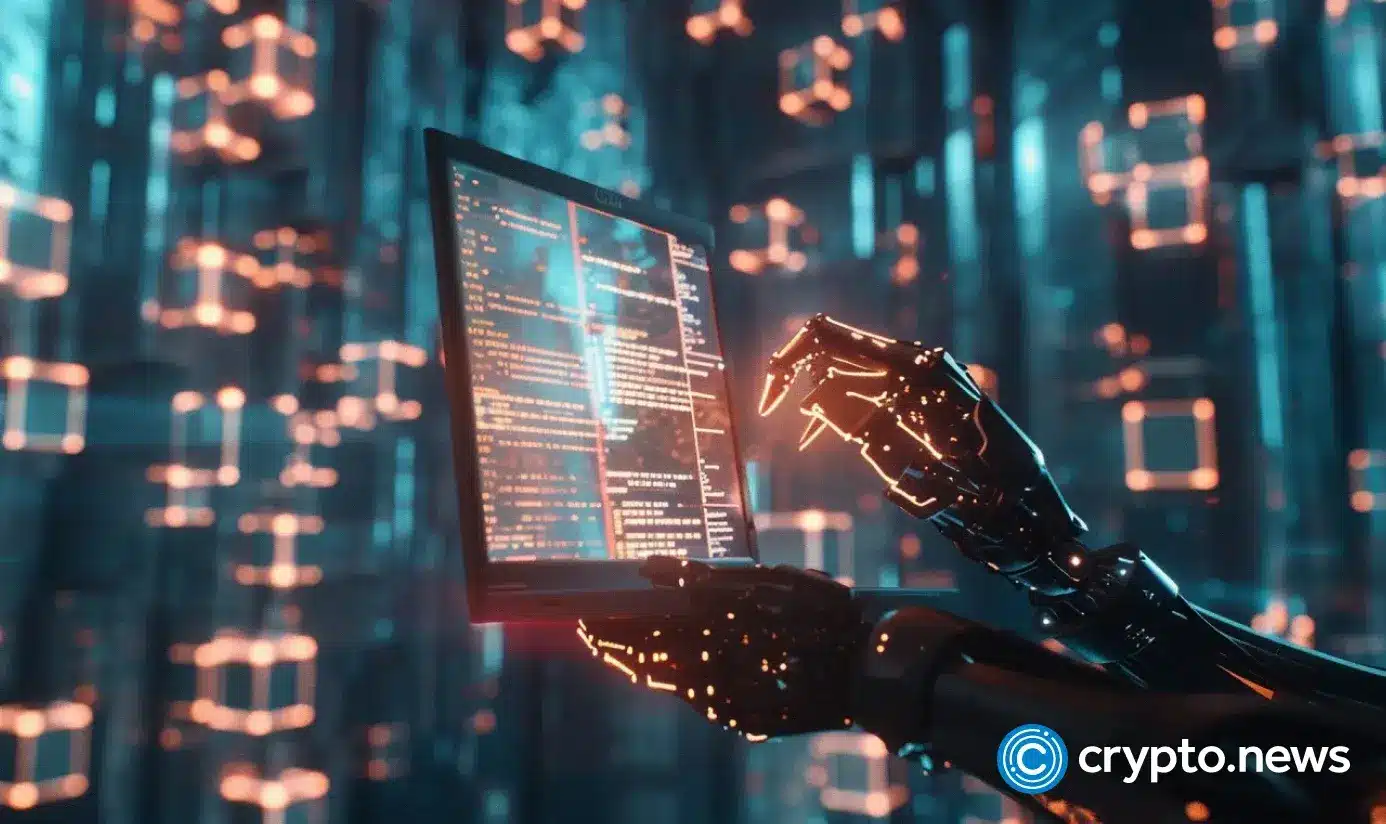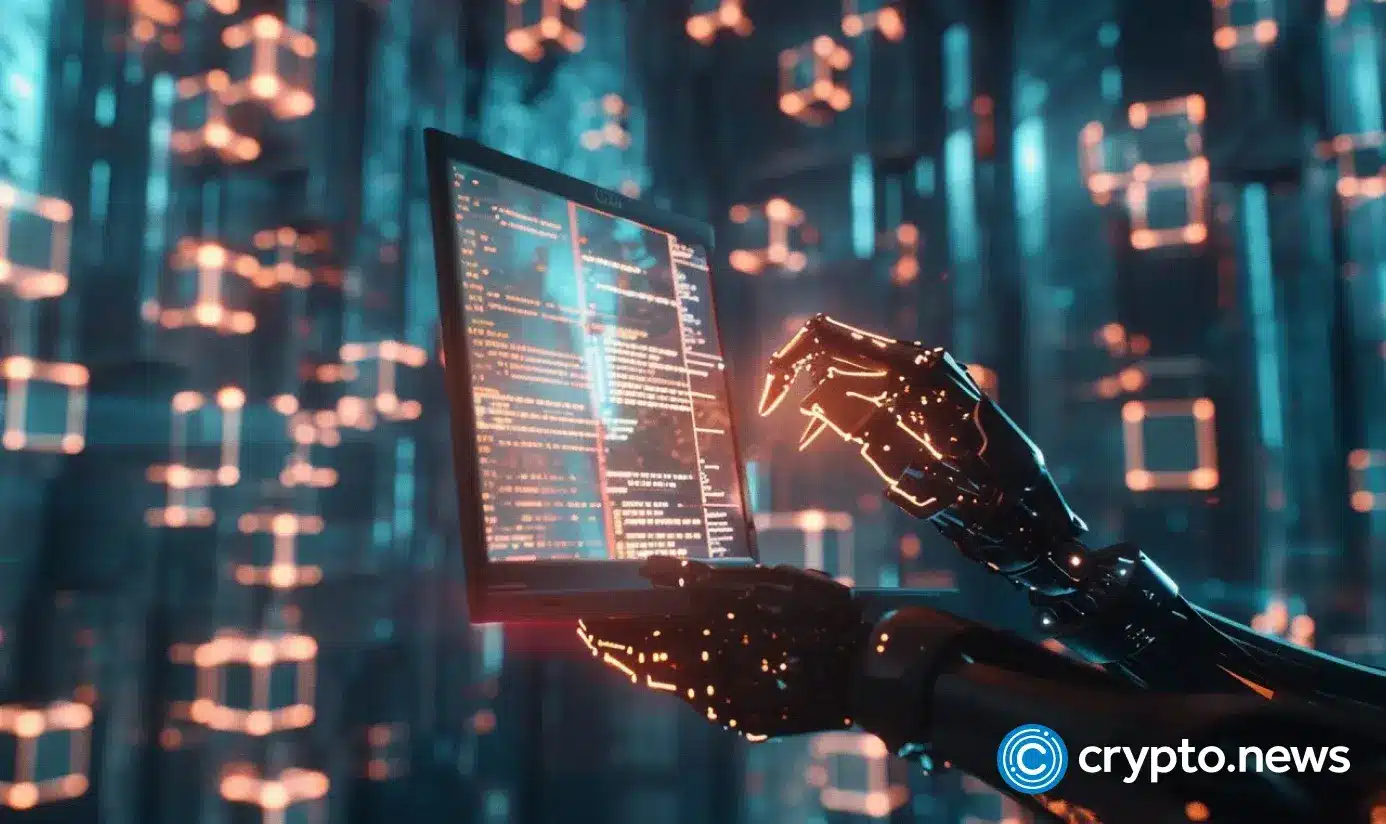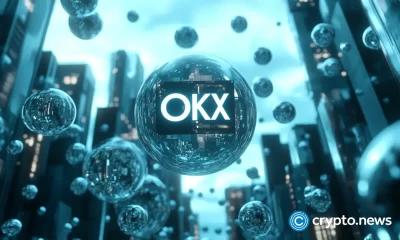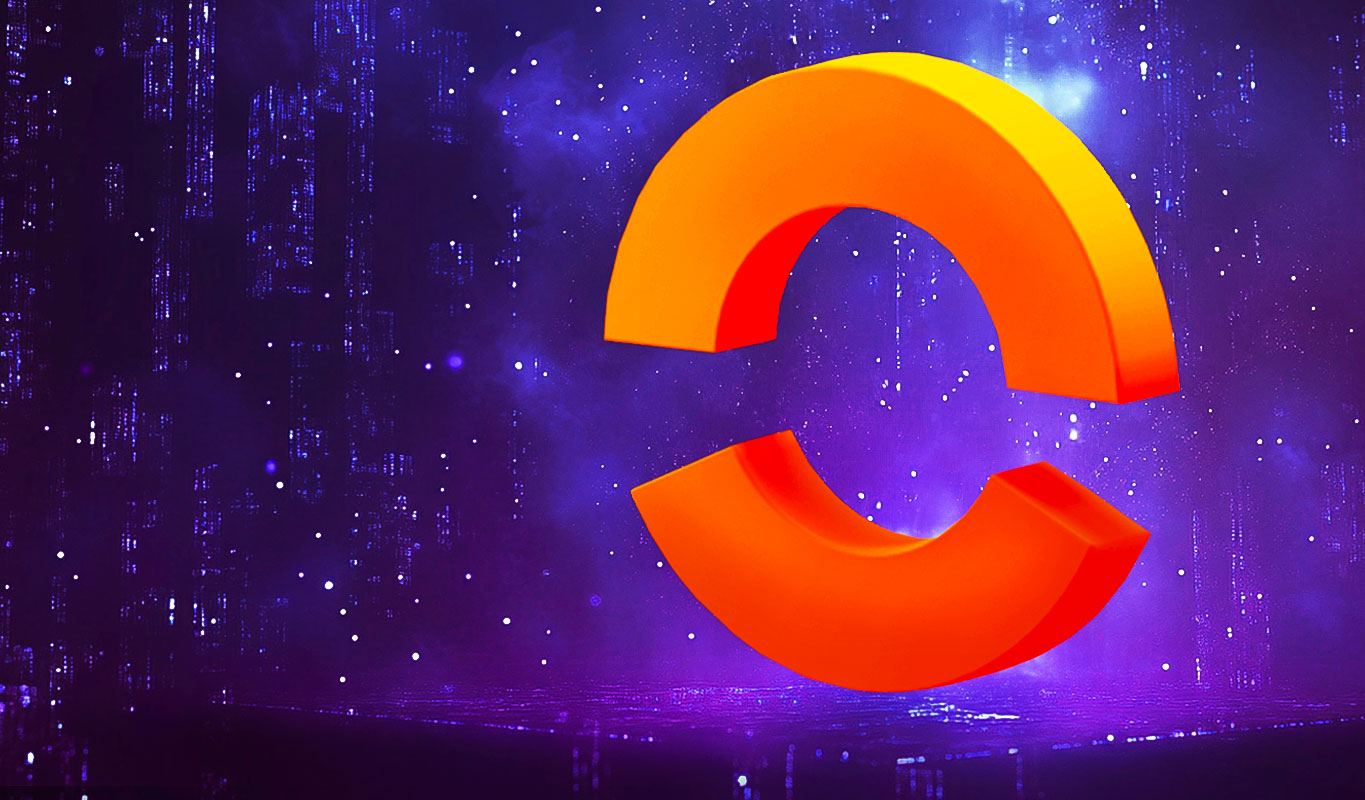Blockchain
NEBRA launches its zero-knowledge proof aggregator on Ethereum
Published
4 months agoon
By
admin

Zero-knowledge proofs platform NEBRA has launched its Universal Proof Aggregation solution, bringing the benefits of ZKP verification to the crypto industry.
NEBRA UPA, which went live on Ethereum (ETH), is a protocol that combines zero-knowledge proofs into a single proof to offer cost-effective on-chain verification. The UPA protocol is designed to boost scaling and privacy across blockchains through proof aggregation, the NEBRA team said in a press release shared with crypto.news.
“Low throughput and the high cost of verification are major obstacles preventing applications from taking full advantage of ZKP technology. But with NEBRA UPA, ZKP is no longer a dream for the future – it is a solution that is available and being used right now,”
Shumo Chu, co-founder and chief executive officer of NEBRA.
A solution for zkEVMs and RaaS protocols
Protocols and projects that benefit from UPA’s solution include zero-knowledge virtual machines, co-processors, roll-up as a service solutions, and consumer applications.
An example of the latter is the WorldCoin (WLD) project, which taps into ZKP for its orb to verify a user is a unique human. The project’s World App uses this technology for identity proof without revealing information. Other notable projects in the ZKP ecosystem include Polygon zkVM, ZK Sync, and Starknet.
The issue of cost
ZKP costs can be prohibitive, but UPA looks to cut this from $20 to $2 for Ethereum and from $2 to $0.2 for layer-2 solutions. The significant reduction in the cost of a ZK proof for everyday crypto use cases, such as buying coffee, will empower developers and add to adoption across decentralized applications.
“Who wants to pay $20 for a ZK proof for a coffee purchase? But when the cost falls to mere cents, innumerable possibilities open up for developing decentralized applications,”
-Nebra co-founder Yi Tong.
NEBRA has raised a total of $4.5 million in funding from crypto venture capital firms, including Andreessen Horowitz, Bankless Ventures, and Nascent. The platform plans to deploy UPA v2 to top L2s to allow more dApps to tap into the benefits of reduced costs for on-chain ZKP use.
Source link
You may like


OKX Launches Perpetual Futures for GRIFFAIN and ZEREBRO


FTX Co-Founder Ryan Salame Sentence Reduced By 1 Year


Crypto Bull Market Much Closer To End Than We Realize, Warns Analyst Jason Pizzino


Trader who called BTC at $105k forecasts $0.0007 meme token at $1 in 2025


Top 5 Biggest Crypto Hacks of 2024


The Best Games of 2024 That You Can Snag for Under $25
Blockchain
MoonPay Considering $150,000,000 Acquisition of Crypto Payment Firm Helio: Report
Published
1 day agoon
December 25, 2024By
admin
The web3 infrastructure provider MoonPay is reportedly mulling a $150 million acquisition of the crypto payments provider Helio.
Fox Business reporter Eleanor Terrett reports that MoonPay is in talks over the deal, which would represent the crypto firm’s largest acquisition.
Helio aims to make “accepting crypto payments effortless for merchants and apps worldwide.” The payment provider supports major chains including Solana (SOL), Ethereum (ETH), Bitcoin (BTC), and Base.
“We power crypto checkouts for +6,000 merchants & apps, and millions of unique active wallets.
You can self-serve to set up a Helio merchant account in minutes & get paid instantly for E-commerce, pre-sales, subscriptions & digital products in USDC, SOL, ETH, BTC & 100s of digital assets.”
In June, the crypto payments firm launched a Solana Pay plugin for the e-commerce giant Shopify, enabling buyers to use SOL and hundreds of other crypto assets with automatic swaps to stablecoins.
MoonPay bills itself as the “world’s leading” web3 infrastructure firm.
“We provide end-to-end solutions for payments, enterprise-scale smart contract development, and digital asset management. Many of the world’s most iconic brands rely on MoonPay to power their Web3 strategies and ideas.”
The crypto firm has more than 20 million verified accounts and is supported in 180 countries.
Don’t Miss a Beat – Subscribe to get email alerts delivered directly to your inbox
Check Price Action
Follow us on X, Facebook and Telegram
Surf The Daily Hodl Mix
 

Disclaimer: Opinions expressed at The Daily Hodl are not investment advice. Investors should do their due diligence before making any high-risk investments in Bitcoin, cryptocurrency or digital assets. Please be advised that your transfers and trades are at your own risk, and any losses you may incur are your responsibility. The Daily Hodl does not recommend the buying or selling of any cryptocurrencies or digital assets, nor is The Daily Hodl an investment advisor. Please note that The Daily Hodl participates in affiliate marketing.
Generated Image: Midjourney
Source link
Blockchain
Blockchain auditor Hacken launches AI-powered MiCA-compliance tool for crypto firms
Published
3 days agoon
December 24, 2024By
admin

Blockchain security auditor Hacken is rolling out a new tool to automate security and compliance for web3 businesses as MiCA and DORA rules loom.
Hacken, an international blockchain auditor with Ukrainian roots, is rolling out a new solution that allows web3 businesses in an automated manner to comply with standards like Europe’s MiCA and DORA.
In a press release shared with crypto.news, Hacken co-founder and chief executive Dyma Budorin said the firm developed the so-called “Extractor” to address the “critical need for proactive monitoring and compliance in the crypto space.” According to the Tallinn-headquartered firm, Extractor brings compliance monitoring framework for web3 projects, making it easier to meet regulatory standards like MiCA, DORA, and ADGM.
Unlike other solutions available on the market, Hacken’s solution is said to be combining AML/CFT monitoring, transaction tracking, total value locked analysis, and circulating supply detection into a structured compliance approach. It also integrates real-time threat detection, automated safeguards, and post-incident reporting to ensure continuous protection and operational resilience, the press release reads.
Valentyna Kondratenko, Hacken’s legal counsel noted that beginning Jan. 17, 2025, DORA’s requirements “will become enforceable,” adding further that non-compliance “can result in severe penalties, such as fines of up to 2% of the total annual worldwide turnover or 1% of the average daily global turnover.”
It’s understood that the solution is compatible with multiple blockchain networks, including Ethereum and BNB Chain (formerly Binance Smart Chain), broadening its potential use.
MiCA regulations have created challenges for crypto companies aiming to expand in the European market. For example, crypto exchange Coinbase had to discontinue USDC rewards for EU clients due to MiCA, and later even delisted Tether (USDT) from its European platform.
Source link
Blockchain
Most Layer 2 solutions are still struggling with scalability
Published
4 days agoon
December 23, 2024By
admin
Disclosure: The views and opinions expressed here belong solely to the author and do not represent the views and opinions of crypto.news’ editorial.
Since pivoting to a layer 2-centric approach, the Ethereum (ETH) ecosystem has relied heavily on L2 solutions to scale. However, these solutions are struggling to compete effectively, especially under pressure from alternatives like Solana (SOL). During the recent meme coin craze, Solana attracted much of the activity due to its advantages: low fees, high transaction speed, and user-friendliness.
To understand the challenges, it’s essential to examine why L2 solutions have not demonstrated the scalability and cost advantages that were widely anticipated.
Why meme projects favor Solana over Ethereum L2s
Meme projects have significantly contributed to the recent surge in market activity. These projects favor Solana for several reasons beyond user-friendliness:
- Low fees: Solana’s low transaction costs make it ideal for fee-sensitive applications like memecoins.
- High speed: Solana’s multithreaded architecture enables high throughput, ensuring seamless user experiences.
- Better developer experience: Solana’s tools and ecosystem are optimized for ease of use, attracting developers and projects.
Why is scalability important?
Scalability is fundamentally measured by the number of transactions a blockchain can process. A highly scalable blockchain can handle more TXs while offering lower fees, making it crucial for widespread adoption and maintaining a seamless user experience.
This is especially important for grassroots projects like meme coins, many of which are short-lived and highly fee-sensitive. Without scalability, these projects cannot thrive, and users will migrate to platforms that offer better efficiency and cost-effectiveness.
Why Ethereum L2s aren’t up to the challenge
Architectural limitations of Ethereum. Ethereum has long faced scalability issues, and L2 rollups are its primary solution to these problems. L2s operate as independent blockchains that process transactions off-chain while posting transaction results and proofs back to Ethereum’s mainnet. They inherit Ethereum’s security, making them a promising scaling approach.
However, Ethereum’s original design poses inherent challenges. Ethereum’s founder, Vitalik Buterin, has admitted that “Ethereum was never designed for scalability.” One of the key limitations is the lack of multithreading in the Ethereum Virtual Machine. The EVM, which processes transactions, is strictly single-threaded, meaning it can handle only one transaction at a time. In contrast, Solana’s multithreaded architecture allows it to process multiple transactions simultaneously, significantly increasing throughput.
L2s inheriting Ethereum’s limitations. Virtually all L2 solutions inherit Ethereum’s single-threaded EVM design, which results in low efficiency. For instance, Arbitrum: With a targeted gas limit of 7 million per second and each coin transfer costing 21,000 gas, Arbitrum can handle about 333 simple transactions per second. More complex smart contract calls consume even more gas, significantly reducing capacity. Optimism: With a gas limit of 5 million per block and a block time of 2 seconds, Optimism can handle only about 119 simple transfers per second. Gas-intensive operations further reduce this capacity.
Unstable fees. Another major issue with Ethereum and its L2 solutions is unstable fees during periods of high network activity. For applications relying on low and stable fees, this is a critical drawback. Projects like meme coins are especially fee-sensitive, making Ethereum-based L2s less attractive.
Lack of interoperability between L2s. The scalability argument for having multiple L2s only holds if contracts on different L2s can interact freely. However, rollups are essentially independent blockchains, and accessing data from one rollup to another is as challenging as cross-chain communication. This lack of interoperability significantly limits the potential of L2 scalability.
What can L2s do to further scale?
Embed features to enhance interoperability. Ethereum L1 needs to do more to support interoperability among L2s. For example, the recent ERC-7786: Cross-Chain Messaging Gateway is a step in the right direction. While it doesn’t fully resolve the interoperability issue, it simplifies communication between L2s and L1, laying the groundwork for further improvements.
Architectural updates: Diverge from the existing L1 design. To compete with multithreaded blockchains like Solana, L2s must break free from Ethereum’s single-threaded EVM design and adopt parallel execution. This may require a complete overhaul of the EVM, but the potential scalability gains make it a worthwhile endeavor.
Future milestones
Ethereum’s L2 solutions face significant challenges in delivering the scalability and cost-effectiveness that applications like meme coins demand. To stay competitive, the ecosystem must address fundamental architectural limitations, enhance interoperability, and embrace innovations in blockchain design. Only by doing so can Ethereum L2s achieve the scalability needed to support widespread adoption and fend off competition from emerging blockchains like Solana.

Laurent Zhang
Laurent Zhang is the president and founder of Arcology Network, a revolutionizing Ethereum layer-2 solution with the first-ever EVM-equivalent, multithreaded rollup—offering unparalleled performance and efficiency for developers building the next generation of decentralized applications. With an executive leadership and innovation background, Laurent holds a degree from Oxford Brookes University. Laurent’s professional journey includes over a decade of experience in science, research, engineering, and leadership roles. After graduating in 2005, he joined MKS Instruments as an Algorithm Engineer. From 2010 to 2012, he worked as a research engineer at the Alberta Machine Intelligence Institute, followed by a position as a research scientist at Baker Hughes from 2012 to 2014. He then served as vice president of engineering at Quikflo Health between 2016 and 2018. Since 2017, Laurent has been the president of Arcology Network, being a visionary of a future where blockchain technology reaches its full potential, offering unmatched scalability, efficiency, and innovation.
Source link

OKX Launches Perpetual Futures for GRIFFAIN and ZEREBRO

FTX Co-Founder Ryan Salame Sentence Reduced By 1 Year

Crypto Bull Market Much Closer To End Than We Realize, Warns Analyst Jason Pizzino

Trader who called BTC at $105k forecasts $0.0007 meme token at $1 in 2025

Top 5 Biggest Crypto Hacks of 2024

The Best Games of 2024 That You Can Snag for Under $25

3 altcoins that could skyrocket by new year’s eve

Analyst Predicts XRP Price To Reach $27, Here’s Why

Monkey Please!

Texas, Ohio, and Pennsylvania to create Bitcoin reserves

Why 2025 Will See the Comeback of the ICO

Can Donald Trump Truly Make US The Crypto Capital?

Why meme coins are fading amidst Bitcoin institutional adoption and gains this cycle

Why Bitcoin Price Is Falling Today: Is $80K Next?

Here Are The Major Bitcoin Support Levels To Watch As Bulls Push For $100,000 Again
182267361726451435

Why Did Trump Change His Mind on Bitcoin?

Top Crypto News Headlines of The Week

New U.S. president must bring clarity to crypto regulation, analyst says

Will XRP Price Defend $0.5 Support If SEC Decides to Appeal?

Ethereum, Solana touch key levels as Bitcoin spikes

Bitcoin Open-Source Development Takes The Stage In Nashville

Bitcoin 20% Surge In 3 Weeks Teases Record-Breaking Potential

Ethereum Crash A Buying Opportunity? This Whale Thinks So

Shiba Inu Price Slips 4% as 3500% Burn Rate Surge Fails to Halt Correction

Washington financial watchdog warns of scam involving fake crypto ‘professors’

‘Hamster Kombat’ Airdrop Delayed as Pre-Market Trading for Telegram Game Expands

Citigroup Executive Steps Down To Explore Crypto
Mostbet Güvenilir Mi – Casino Bonus 2024

NoOnes Bitcoin Philosophy: Everyone Eats
Trending

 3 months ago
3 months ago182267361726451435

 Donald Trump5 months ago
Donald Trump5 months agoWhy Did Trump Change His Mind on Bitcoin?

 24/7 Cryptocurrency News4 months ago
24/7 Cryptocurrency News4 months agoTop Crypto News Headlines of The Week

 News4 months ago
News4 months agoNew U.S. president must bring clarity to crypto regulation, analyst says

 Price analysis5 months ago
Price analysis5 months agoWill XRP Price Defend $0.5 Support If SEC Decides to Appeal?

 Bitcoin5 months ago
Bitcoin5 months agoEthereum, Solana touch key levels as Bitcoin spikes

 Opinion5 months ago
Opinion5 months agoBitcoin Open-Source Development Takes The Stage In Nashville

 Bitcoin5 months ago
Bitcoin5 months agoBitcoin 20% Surge In 3 Weeks Teases Record-Breaking Potential


